This was originally a paper I wrote for a Sociology course over at UCSD back in 2012. Even after the passage of several years, I still consider what I articulate in this paper to be representative of my current views on the topic.
Are Black Americans owed reparations for the oppression they have suffered throughout American history? Many if not most White Americans would say no, whereas many if not most Black Americans would say yes. The question of reparations is a racially polarizing one, and since Whites form the demographic majority and socioeconomically dominant ethnic group in America, this has meant that reparations have never been paid. This payment is long overdue. Since Black Americans have suffered from and continue to suffer today an ancient legacy of racial oppression, a reparations program for them is long overdue.
The most commonly cited objections to reparations for African-Americans’ suffering are that slavery ended too long ago and that many White Americans’ ancestors never owned slaves, therefore absolving Whites as a collective of any responsibility over the issue. The former argument would be valid if slavery was the only historical crime against Black Americans and if modern Blacks did not suffer from its effects, but neither of these conditions have been met. The oppression and unfavorable treatment that Blacks received continued even after slavery was formally abolished and still affects the modern Black experience. As for the second argument, while Whites as a whole may not have been guilty of slavery, they have benefited from a racist social hierarchy that favored them over Blacks. This is not a question of making White people feel guilty about what a few of their ancestors did over 150 years ago. The fundamental issue is one of healing a larger legacy of racism that elevated Whites about Blacks.
Continue reading “The Case for African-American Reparations”


